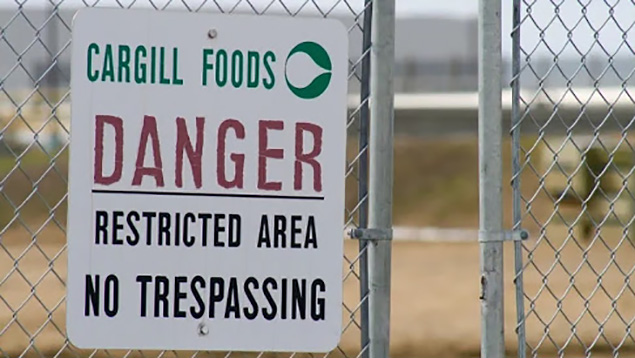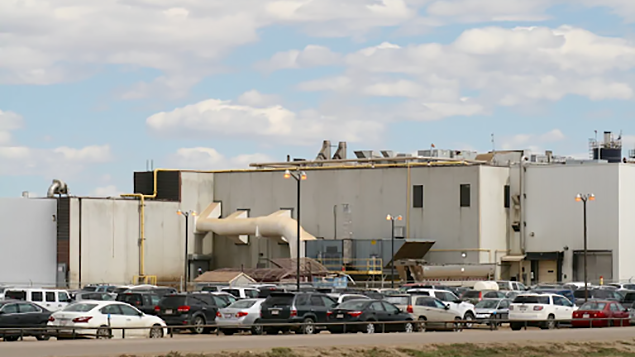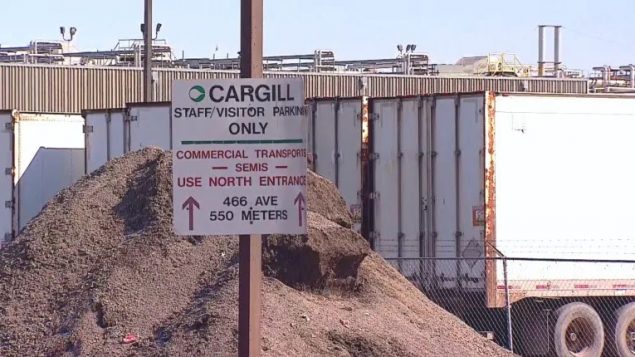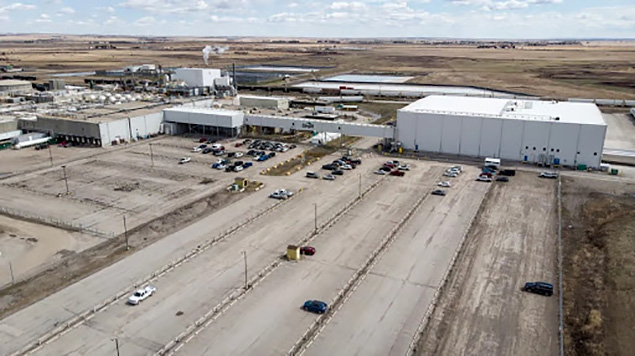Labor leaders in Alberta are calling for a criminal investigation and public inquiry into two meat processing plants where two workers have died this month and more than 1,300 other people have been infected with COVID-19.
The call came as Canadians marked the National Day of Mourning, a world-wide event now observed in over 100 countries, that honours workers who have died, been injured or been made ill while on the job.
Traditionally, employers and workers have observed the National Day of Mourning by lighting candles, laying wreaths, or wearing commemorative pins, ribbons or black armbands.

A sign outside the JBS meat-processing plant in Brooks, Alta., thanks workers for continuing to show up during the pandemic. Hundreds of workers at the plant have now contracted COVID-19. (CBC)
Data compiled by the Association of Workers’ Compensation Boards of Canada shows that worker fatalities have been increasing since 1993, when there were a total of 758 fatalities across the country, to 1,014 last year — almost three people every day. There have been more than 16,000 worker fatalities since 1993.
The COVID-19 pandemic has compounded matters in many workplaces, not the least of which are Alberta meat-processing plants where workers say the conditions put them in grave danger.

Alberta has seen a surge in COVID-19 cases in meat-processing plants and labour leaders in the province say they’ve seen enough. (Dan McGarvey/CBC)
That’s the largest COVID outbreak linked to a single site in Canada.
Another 249 employees have tested positive at a second meat-packing plant, JBS in Brooks, about 180 kilometres southeast of Calgary, where the other meat-plant worker died this month.
The plant remains open.

Labor leaders in Alberta want the JBS meat-packing facility in Brooks closed for at least two weeks.. (Dan McGarvey/CBC)
On Tuesday, Alberta labour leaders said it should be closed for at least two weeks and an online petition calling for a shutdown has garnered thousands of signatures.
The two plants have more than 4,500 workers and supply more than two-thirds of Canada’s beef.
A large percentage of the workers are Filipino, some of whom are temporary foreign workers (TFWs) and others who are permanent residents.

Elma Ton, second from right, says she has been disappointed to see comments making fun of the Filipino community online in the wake of the Cargill outbreak. Her husband Rodel Ton, far right, works at Cargill. (Submitted by Elma Ton)
Earlier this week, they told CBC News’ Joel Dryden they were tired of being blamed for the COVID-19 outbreak.
Last week, Alberta Occupational Health and Safety announced it is investigating the conditions at the two plants.
Calgary and District Labour Council president Alexander Shevalier says he has little faith in the investigation.

Cargill closed its plant temporarily earlier this month following the death of a worker. (Charlotte Dumoulin/Radio-Canada)
“We think the provincial government has botched this badly, and we think that to prevent this from happening again we need to know exactly what happened and what went wrong,” Shevalier told the Calgary Herald’s Jason Herring.
“I do not have confidence (in OHS) because they did a virtual investigation and declared the Cargill workplace to be safe.”
With files from CBC News (Sarah Rieger, Joel Dryden), The Canadian Press (Bill Graveland)







For reasons beyond our control, and for an undetermined period of time, our comment section is now closed. However, our social networks remain open to your contributions.